Families. By turns they leave us feeling loved and cherished as well as sometimes frustrated and confused, but love them or loathe them, there is no denying that the members of our families have great importance in our lives and keep us grounded and feeling supported. Open the cover of many books for children or teens, and you will find that family matters in many ways—no matter what form that family may take. This week’s reviews explore family and might prompt some readers to craft a gratitude list for their family.
Ages 4–8
Bat Count: A Citizen Science Story. Anna Forrester. Ill. Susan Detwiler. 2017. Arbordale.
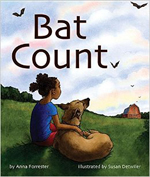 JoJo’s family share an interest in helping an endangered species survive by counting the bats that fly from their barn at dusk. After JoJo’s mother becomes worried about the species whose numbers are dropping due to white-nose syndrome, she enlists her family in counting them and sharing the data with scientists. From a high of thirty-nine one summer to a low of one in the last year, the numbers have dwindled. As JoJo’s family keep an eye on the sky, they spot three bats, a mother and two offspring. JoJo becomes hopeful that more bats will be born in future years, and perhaps the species will rebound. Back matter includes information about white-nose syndrome, a fungal infection which is killing bats, and an illustration of a diseased bat; bat facts; and background on how citizen scientists can become involved in helping researchers as they work to save bats. JoJo’s family is just one of many families who share an interest in solving environmental problems.
JoJo’s family share an interest in helping an endangered species survive by counting the bats that fly from their barn at dusk. After JoJo’s mother becomes worried about the species whose numbers are dropping due to white-nose syndrome, she enlists her family in counting them and sharing the data with scientists. From a high of thirty-nine one summer to a low of one in the last year, the numbers have dwindled. As JoJo’s family keep an eye on the sky, they spot three bats, a mother and two offspring. JoJo becomes hopeful that more bats will be born in future years, and perhaps the species will rebound. Back matter includes information about white-nose syndrome, a fungal infection which is killing bats, and an illustration of a diseased bat; bat facts; and background on how citizen scientists can become involved in helping researchers as they work to save bats. JoJo’s family is just one of many families who share an interest in solving environmental problems.
A Cat Named Swan. Holly Hobbie. 2017. Random House.
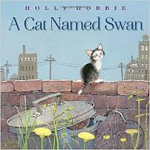 After his mother and siblings disappear from their cardboard box in an alley, a kitten is left to fend for himself. It isn't easy, but he manages to survive. The illustrations show just how small he is and how much danger surrounds him on the city streets. An animal control officer rescues the kitten and takes him to a shelter, from which he is adopted. As he grows accustomed to his new name—Swan—and his new family and their daily routines, he realizes that he is safe in his forever home. Although he lost one family at the start of the book, he finds another one at its conclusion. All members of Swan’s new family, including Woody the dog, integrate him into their lives. Reading this picture book, with pencil-and-watercolor illustrations which contain many details and rich colors featuring the cute kitten, may prompt readers to make a trip to a shelter to find their own purring machine to add to their family. Swan’s adoption changed his life as well as the lives of his human companions.
After his mother and siblings disappear from their cardboard box in an alley, a kitten is left to fend for himself. It isn't easy, but he manages to survive. The illustrations show just how small he is and how much danger surrounds him on the city streets. An animal control officer rescues the kitten and takes him to a shelter, from which he is adopted. As he grows accustomed to his new name—Swan—and his new family and their daily routines, he realizes that he is safe in his forever home. Although he lost one family at the start of the book, he finds another one at its conclusion. All members of Swan’s new family, including Woody the dog, integrate him into their lives. Reading this picture book, with pencil-and-watercolor illustrations which contain many details and rich colors featuring the cute kitten, may prompt readers to make a trip to a shelter to find their own purring machine to add to their family. Swan’s adoption changed his life as well as the lives of his human companions.
Ages 9–11
Molly & Pim and the Millions of Stars. Martine Murray. 2017. Alfred A. Knopf/Random House.
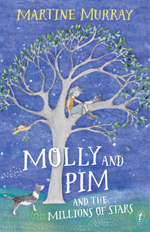 Unaware of the disadvantages, ten-year-old Molly desperately wants to blend in and be just like everyone else. But her mother, who is an herbalist and concocts various potions for what ails her family and neighbors, is clearly different from the other mothers. When her mother accidentally turns herself into a beautiful tree, Molly is left to her own devices. Alone and desperate, Molly enlists the help of Pim Wilder, a classmate who is interested in things that are different and doesn't question her story about her mother’s potions. Together, they come up with some possible solutions to her mother's plight, and along with another classmate, face down a threat from her grouchy neighbors to cut down the tree. This gently told story will have readers believing in the magic that surrounds Molly’s mother. By the book's conclusion, Molly has come to terms with her own uniqueness. Like the stars that shine above Molly and her mother, each person has something worth noticing and something that makes them stand out. Why would we ever want to hide that light or change that person to a dimmer wattage? The book offers readers important life lessons about self-acceptance.
Unaware of the disadvantages, ten-year-old Molly desperately wants to blend in and be just like everyone else. But her mother, who is an herbalist and concocts various potions for what ails her family and neighbors, is clearly different from the other mothers. When her mother accidentally turns herself into a beautiful tree, Molly is left to her own devices. Alone and desperate, Molly enlists the help of Pim Wilder, a classmate who is interested in things that are different and doesn't question her story about her mother’s potions. Together, they come up with some possible solutions to her mother's plight, and along with another classmate, face down a threat from her grouchy neighbors to cut down the tree. This gently told story will have readers believing in the magic that surrounds Molly’s mother. By the book's conclusion, Molly has come to terms with her own uniqueness. Like the stars that shine above Molly and her mother, each person has something worth noticing and something that makes them stand out. Why would we ever want to hide that light or change that person to a dimmer wattage? The book offers readers important life lessons about self-acceptance.
Town Is by the Sea. Joanne Schwartz. 2017. Groundwood/House of Anansi.
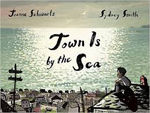 Not all parents enjoy the jobs they have that support their families economically, but they perform the necessary tasks because they must be done. In this moving picture book, set in the coal mining town of Cape Breton, Nova Scotia, in the 1950s, a young boy spends his day in a most satisfactory fashion, enjoying the scenery, hanging out with a friend, doing errands for his mother, and stopping by his grandfather's grave. While he enjoys the carefree moments of his childhood, his father is working beneath the surface of the sea digging for coal. For the boy and the man, the best moments of the day are when the father returns to the surface and trudges home where he enjoys dinner with his family and gazes at the sea near their home. The last lines and the author's note let readers know that the boy realizes that his carefree life is soon going to change as he, too, must begin working in the mine. The illustrations, created in ink, watercolor, and gouache, effectively contrast the beauty of the ocean and the boy's town with the bleakness of the dark spaces in which his father labors. Concluding the book on a note of acceptance of his fate because "in my town, that's the way it goes" leaves readers thinking about life choices and the expectations and limitations placed on us by our environment, our upbringing, and the options that are available. The simple yet eloquent text and powerful visual images tug relentlessly at readers' hearts.
Not all parents enjoy the jobs they have that support their families economically, but they perform the necessary tasks because they must be done. In this moving picture book, set in the coal mining town of Cape Breton, Nova Scotia, in the 1950s, a young boy spends his day in a most satisfactory fashion, enjoying the scenery, hanging out with a friend, doing errands for his mother, and stopping by his grandfather's grave. While he enjoys the carefree moments of his childhood, his father is working beneath the surface of the sea digging for coal. For the boy and the man, the best moments of the day are when the father returns to the surface and trudges home where he enjoys dinner with his family and gazes at the sea near their home. The last lines and the author's note let readers know that the boy realizes that his carefree life is soon going to change as he, too, must begin working in the mine. The illustrations, created in ink, watercolor, and gouache, effectively contrast the beauty of the ocean and the boy's town with the bleakness of the dark spaces in which his father labors. Concluding the book on a note of acceptance of his fate because "in my town, that's the way it goes" leaves readers thinking about life choices and the expectations and limitations placed on us by our environment, our upbringing, and the options that are available. The simple yet eloquent text and powerful visual images tug relentlessly at readers' hearts.
Ages 12–14
Addie Bell’s Shortcut to Growing Up. Jessica Brody. 2017. Delacorte/Random House.
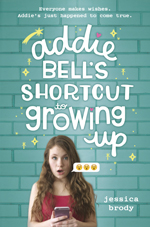 Ah, to be sixteen and to have the world at your feet! Desperate to be sixteen like her older sister, Rory, who wears makeup, is popular, and has a boyfriend, Adeline (Addie) Bell is sure that life will be perfect when she’s older. After she and her best friend, Grace, have a fight on her twelfth birthday, Addie makes a wish using a special jewelry box given to her by an elderly neighbor, and everything changes. She awakens the next morning to find that her wish to be sixteen has been granted. However, having missed out on those four years between twelve and sixteen leaves her at a serious disadvantage. Not only does she not know how to drive her car or put on makeup or even pull together an outfit, but she doesn't understand how to deal with boys or how to flirt. And the trigonometry and French she should know after studying the subjects for years? Forget it! Adeline is completely lost. She may look sixteen, but at heart Adeline is still an innocent twelve-year-old. She comes to realize that many things have changed in her family, and she barely recognizes herself or her parents. And where is her sister, Rory, and her friend Grace? The story is amusing, serving as a cautionary tale about wanting to grow up too fast. After all, once those early teen years are gone, they're gone forever.
Ah, to be sixteen and to have the world at your feet! Desperate to be sixteen like her older sister, Rory, who wears makeup, is popular, and has a boyfriend, Adeline (Addie) Bell is sure that life will be perfect when she’s older. After she and her best friend, Grace, have a fight on her twelfth birthday, Addie makes a wish using a special jewelry box given to her by an elderly neighbor, and everything changes. She awakens the next morning to find that her wish to be sixteen has been granted. However, having missed out on those four years between twelve and sixteen leaves her at a serious disadvantage. Not only does she not know how to drive her car or put on makeup or even pull together an outfit, but she doesn't understand how to deal with boys or how to flirt. And the trigonometry and French she should know after studying the subjects for years? Forget it! Adeline is completely lost. She may look sixteen, but at heart Adeline is still an innocent twelve-year-old. She comes to realize that many things have changed in her family, and she barely recognizes herself or her parents. And where is her sister, Rory, and her friend Grace? The story is amusing, serving as a cautionary tale about wanting to grow up too fast. After all, once those early teen years are gone, they're gone forever.
Falling Over Sideways. Jordan Sonnenblick. 2016. Scholastic.
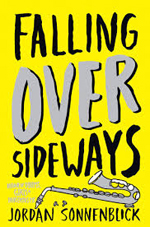 Eighth-grader Claire is fed up with her life. Nothing is going right—at school, in dance class, or at home. Her science teacher seems unstable, constantly comparing her current students to her daughter, the incomparable Meredith. Her lunch companions steal her Skittles, and Ryder, her band nemesis, leaves her in the dust in playing the alto saxophone. Two of her closest friends have moved up in an advanced dance group while she remains with the younger ones. But these issues pale in significance after her father, who is a writer, has a stroke in front of Claire. Although her quick thinking saves his life, the recovery process is painstakingly slow, and she worries that he will never be the same. As the family adjusts to the changes in their lives while supporting his needs, Claire is embarrassed about her father’s appearance and physical and intellectual struggles and worries that her classmates will tease her. This is a great novel to share with middle graders trying to come to terms with an unexpected family event.
Eighth-grader Claire is fed up with her life. Nothing is going right—at school, in dance class, or at home. Her science teacher seems unstable, constantly comparing her current students to her daughter, the incomparable Meredith. Her lunch companions steal her Skittles, and Ryder, her band nemesis, leaves her in the dust in playing the alto saxophone. Two of her closest friends have moved up in an advanced dance group while she remains with the younger ones. But these issues pale in significance after her father, who is a writer, has a stroke in front of Claire. Although her quick thinking saves his life, the recovery process is painstakingly slow, and she worries that he will never be the same. As the family adjusts to the changes in their lives while supporting his needs, Claire is embarrassed about her father’s appearance and physical and intellectual struggles and worries that her classmates will tease her. This is a great novel to share with middle graders trying to come to terms with an unexpected family event.
Ages 15+
Every Hidden Thing. Kenneth Oppel. 2016. Simon & Schuster.
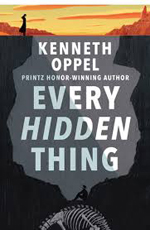 Inspired by a real-life rivalry between two paleontologists, this book takes readers into the Dakota badlands after the Civil War as whites continue to intrude on the land of Native Americans. The patriarchs of two families—the Bolts and the Cartlands—have tried to outdo each other in finding the best fossils, and now both have mounted separate expeditions to locate and unearth an enormous one, based on the information of a man who digs bones as a hobby. Both paleontologists are willing to go to any lengths to claim that fossil. These are imperfect men, with tempers, slippery moral compasses, and hubris. Their offspring, Rachel Cartland and Samuel Bolt, are reluctantly attracted to one another. Rachel, who has always considered herself plain but adept with fossils, wrangles a spot on her father's expedition with the intent of persuading him to support her dreams of attending college. Samuel is attracted to Rachel because of her intelligence and their shared passion for fossils. The relationship flounders on trust issues amid rich descriptions of the vast landscape in which their families’ drama plays out. There are philosophical bits threaded throughout the book as Rachel ponders what remains behind after we die, just as she considers how paleontologists conjecture the actual size, shape, appearance, and habits of dinosaurs from their remains. The complexity of the characters and their family dynamics is revealed in their actions, as they sometimes act against their own best interests.
Inspired by a real-life rivalry between two paleontologists, this book takes readers into the Dakota badlands after the Civil War as whites continue to intrude on the land of Native Americans. The patriarchs of two families—the Bolts and the Cartlands—have tried to outdo each other in finding the best fossils, and now both have mounted separate expeditions to locate and unearth an enormous one, based on the information of a man who digs bones as a hobby. Both paleontologists are willing to go to any lengths to claim that fossil. These are imperfect men, with tempers, slippery moral compasses, and hubris. Their offspring, Rachel Cartland and Samuel Bolt, are reluctantly attracted to one another. Rachel, who has always considered herself plain but adept with fossils, wrangles a spot on her father's expedition with the intent of persuading him to support her dreams of attending college. Samuel is attracted to Rachel because of her intelligence and their shared passion for fossils. The relationship flounders on trust issues amid rich descriptions of the vast landscape in which their families’ drama plays out. There are philosophical bits threaded throughout the book as Rachel ponders what remains behind after we die, just as she considers how paleontologists conjecture the actual size, shape, appearance, and habits of dinosaurs from their remains. The complexity of the characters and their family dynamics is revealed in their actions, as they sometimes act against their own best interests.
Piper Perish. Kayla Cagan. 2017. Chronicle.
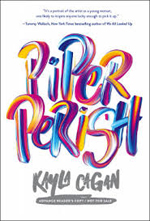 Art will surely provide the escape route senior Piper Perish needs to leave her Houston, Texas, home far behind. She and her best friend, Kit, and boyfriend, Enzo, have always planned to head to New York City and take the art world by storm. But even with the support and guidance of her art teacher, Ms. Adams, life might have other plans for Piper. In between constant battles with her older sister, Marli, whose emotional grip on the family is daunting, and odd behavior from Kit as well as Enzo's very public break-up with Piper as he realizes he prefers guys, Piper still finds the energy and motivation to create. Can her art truly save her or will it just lead to heartbreak and disappointment? The author folds in inspiring quotes from Andy Warhol and others, and splashes paint and paintings throughout the text as would be likely in journal entries of someone like Piper. The dynamics at work within her family and daily life will have readers wondering how Piper manages to create anything, and yet out of all that drama comes artwork that is memorable, even if not everyone in her family understands it.
Art will surely provide the escape route senior Piper Perish needs to leave her Houston, Texas, home far behind. She and her best friend, Kit, and boyfriend, Enzo, have always planned to head to New York City and take the art world by storm. But even with the support and guidance of her art teacher, Ms. Adams, life might have other plans for Piper. In between constant battles with her older sister, Marli, whose emotional grip on the family is daunting, and odd behavior from Kit as well as Enzo's very public break-up with Piper as he realizes he prefers guys, Piper still finds the energy and motivation to create. Can her art truly save her or will it just lead to heartbreak and disappointment? The author folds in inspiring quotes from Andy Warhol and others, and splashes paint and paintings throughout the text as would be likely in journal entries of someone like Piper. The dynamics at work within her family and daily life will have readers wondering how Piper manages to create anything, and yet out of all that drama comes artwork that is memorable, even if not everyone in her family understands it.
Barbara A. Ward teaches graduate and undergraduate courses in literacy at Washington State University, Pullman. She spent 25 years teaching in the public schools of New Orleans, where she worked with students at every grade level, from kindergarten through high school, as well as several ability levels. She is certified in elementary education, English education, and gifted education. She holds a bachelor's in Communications, a master's in English Education from the University of Tennessee and a PhD in Curriculum and Instruction from the University of New Orleans.
These reviews are submitted by members of the International Literacy Association's Children's Literature and Reading Special Interest Group (CL/R SIG) and are published weekly on Literacy Daily.